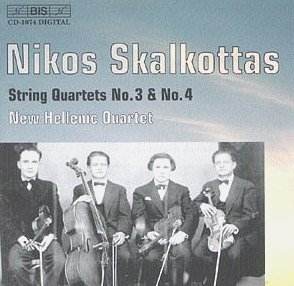Nikos SKALKOTTAS
String Quartets nos. 3 & 4.
 New Hellenic String Quartet
New Hellenic String Quartet
 BIS CD 1074 [57'
48"]
BIS CD 1074 [57'
48"]
Crotchet
Amazon
UK
Amazon
USA

In Nikos Skalkottas' massive fourth string quartet (1940), this CD
has some of the most dense and eventful music you are ever likely to encounter.
It is a tough nut to crack, having a quality of superabundant energy and
inventiveness which is, by turns, invigorating, exhilarating and finally
exhausting.
The third quartet (1935) is far easier to respond to. I have known it for
many years through a treasured an EMI-Greece box of LPs, which has a good
range of Skalkottas' chamber music, and enough of the piano music to arouse
the keenest interest. I played then the compact Variations, and have
struggled too with some of the innovative, accessible and important 32
Pieces, which were even broadcast in their entirety by Radio3 (I hope
particularly that these are scheduled for issue on BIS?).
Those LPs had too the lavish documentation with numerous illustrations, something
which was fairly common then, but is now a thing of the past. It is worth
looking out for, though long unavailable - (14C 163-70981/2/3/4). Some of
the playing is a bit rough & ready, but not sufficiently so to dampen
enthusiasm, which has remained with me until BIS has caught up with this
important and life enhancing music half a century on.
I was therefore disappointed not to have learned of the recent visit to London
of the New Hellenic Quartet until after it had taken place. They had come
especially to perform the two works featured on this CD, the last two of
Skalkottas's four string quartets (the score of the second is missing). Richard
Whitehouse attended the Hellenic Centre for Seen&Heard and I quote
from his review:-
- - - Some composers are so unfashionable that even the centenary of their
birth warrants little or no coverage. Were there any UK performances in 1996
for Roger Sessions's 100th? If the 50th anniversary of Nikos
Skalkottas's death might seem equally worth overlooking, remember the
significance his music attracted back in the 1950s and '60s, when Hans Keller
lauded him as one of the five most significant composers this century - -
- since when his music has fallen into the 'respected but unheard' category,
with little available on disc until the Swedish company BIS began their excellent
series of recordings last year - - - - - dating from 1935, the Third Quartet
marks the onset of Skalkottas's maturity; the serial method of Schoenberg
is treated flexibly and creatively, along with a rhythmic dynamism which,
stemming from Stravinsky and even Bartók, has become equally personal.
The three movements play for 20 minutes, beginning with an Allegro moderato
where the distinction between harmonic and thematic presentation of the material
is integral to the music's dynamism. The Andante has a heightened
lyricism redolent of Berg's Lyric Suite, while the closing Allegro
vivace is relaxed to the extent that its underlying ländler
rhythm offsets the metamorphoses of the main rondo theme.
The Fourth Quartet of 1940 takes this musical idiom to its relative extreme.
Playing for 38 minutes, it requires a stamina comparable to the late quartets
of Beethoven and the first quartet of Schoenberg: sobering to think that
it was completed in little more than four weeks, and is only one of a whole
series of large-scale works that Skalkottas worked on during the remainder
of his short life. The opening Allegro molto vivace achieves its
expansiveness through dynamic, subtle cross-referencing of themes, rather
than by its actual length, while the Andante molto espressivo has
a musical and emotional breadth which more than sustains the six diverse
variations on its opening melody. The Presto must be unequalled in
the literature for sheer velocity, with the lilting trio making an almost
surreal contrast. If the Allegro guisto finale seems not quite to
wrap up the piece conclusively, this may be because of its brevity and swiftness
of thought. Perhaps it would be more convincing played attacca after
the scherzo? At any rate, the New Hellenics powered through to the final
bars with absolute conviction, and to deservedly prolonged applause.
The New Hellenic Quartet's recording of Skalkottas's string quartet music
is due for release on BIS next spring. For now, Georgios Demertzis's account
of the violin concerto, and his just-released disc of the chamber music for
violin (BIS-CD-1024) are mandatory listening for anyone willing to give this
extraordinarily original and engrossing composer the attention his music
so richly deserves.
This CD does not disappoint. The players, led by Georgios Demertzis, obviously
have this, at times severe, dodecaphonic music in their bones and are undaunted
by its complexity. It is however more austere than some of the other music
released by BIS, so I would not recommend it as your first Skalkottas purchase
- others have been reviewed on MotW (see below). The September 1999 recording
of the two quartets made in Athens is entirely satisfactory and the background
information includes a detailed analysis of Skalkottas's music for string
quartet, as well as notes about his strange life and an introduction to his
unique style.
see also
SKALKOTTAS
The Maiden and Death; Piano Concerto No 1 (Geoffrey Douglas Madge) and Ouverture
Concertante Iceland Symphony Orchestra, cond. Nikos Christodoulou. BIS CD
1014
SKALKOTTAS
Violin Music (solo sonata; four sonatinas; seven pieces) Georgios Demertzis
(violin) Maria Asteriadou (piano) BIS 1024
Reviewer
Peter Grahame Woolf

